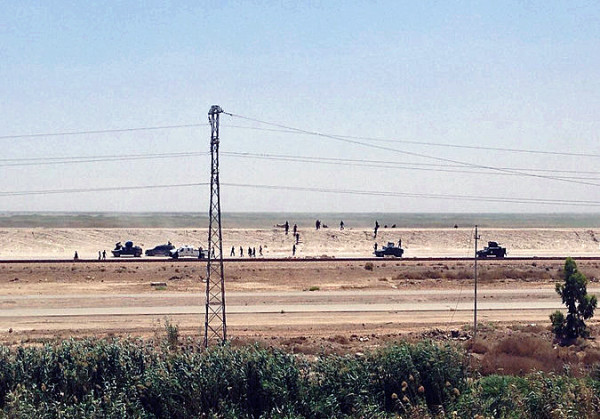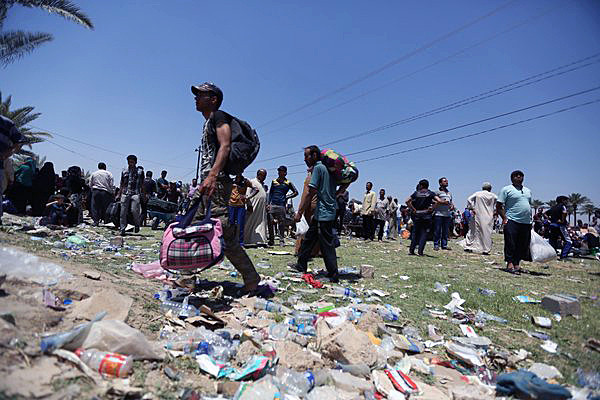PBS: Escaping Eritrea … [Read More...] about ካብ ውሽጢ ቤት ማእሰርታት ኤርትራ
Key Iraqi City Falls to ISIS as Last of Security Forces Flee
BAGHDAD — The last Iraqi security forces fled the provincial capital of Ramadi on Sunday, as the city fell completely to the militants of the Islamic State, who ransacked the provincial military headquarters, seizing a large store of weapons, and carried out executions of people loyal to the government, according to security officials and tribal leaders.
The fall of Ramadi to the Islamic State, despite intensified American airstrikes in recent weeks in a bid to save the city, represented the biggest victory so far this year for the extremist group, which has declared a caliphate, or Islamic state, in the vast areas of Syria and Iraq that it controls. The fall of Ramadi also laid bare the failed strategy of the Iraqi government, which had announced last month a new offensive to retake Anbar Province, a vast desert region in the west of which Ramadi is the capital.
“The city has fallen,” said Muhannad Haimour, the spokesman for Anbar’s governor. Mr. Haimour said that at least 500 civilians and security personnel had been killed over the last two days in and around Ramadi, either from fighting or executions. Among the dead, he said, was the 3-year-old daughter of a soldier.
“Men, women, kids and fighters’ bodies are scattered on the ground,” said Sheikh Rafe al-Fahdawi, a tribal leader from Ramadi, who was in Baghdad on Sunday and whose men had been resisting the Islamic State, also known as ISIS or ISIL. He also said, “All security forces and tribal leaders have either retreated or been killed in battle. It is a big loss.”

With defeat looming in Ramadi on Sunday afternoon, the Anbar Provincial Council met in Baghdad and voted to ask Prime Minister Haider al-Abadi to send Shiite irregulars to rescue Anbar, a largely Sunni province. In response, Mr. Abadi issued a statement calling for the militias, known as the Popular Mobilization Forces and including several powerful Shiite forces supported by Iran, to be ready to fight in Anbar. Some of the Shiite irregular units, which were formed last summer after Shiite clerics put out a call to arms, are more firmly under the command of the government, while others answer to Iran.
The involvement of the militias in Anbar had been opposed by the United States, which leads an international coalition that has been carrying out airstrikes in support of Iraqi forces. American officials had worried the militias could inflame sectarian tensions in the province and ultimately make it harder to pacify.
As they considered asking for the assistance of the militias, Anbar officials met over the weekend with the American ambassador to Iraq, Stuart E. Jones, to ascertain the United States position on the issue. According to officials, Mr. Jones told the Anbar delegation that the United States would continue its air campaign, provided that the militias were under the command of Mr. Abadi, and not Iranian advisers, and that the militias were properly organized so as to avoid becoming casualties of American bombing runs.
At the outset of an offensive to liberate Tikrit, in Salahuddin Province, in March, the Iranian-backed militias took the lead on the ground, and American warplanes stayed away. Once those militias stalled, Mr. Abadi ordered them to retreat, which was followed by American airstrikes and an advance by Iraqi security forces, and the liberation of Tikrit.
In the wake of that victory, Mr. Abadi promised a new effort in Anbar, a campaign that was supposed to be led by the Iraqi security forces and supported by American airstrikes, with Iran and its militias on the sidelines. A key component of that strategy was to arm local Sunni tribesmen to do the fighting, but that plan never materialized in large numbers, partly because of resistance by powerful Shiite political leaders in Baghdad.
The deterioration of Anbar over the last month underscored the ineffectiveness of the Iraqi Army, which is being trained by American military advisers, and raised questions about the United States strategy to defeat the Islamic State. At the same time, now that the militias are being called upon, the collapse of Ramadi has demonstrated again the influence of Iran, even if its advisers are unlikely to be on the ground in Anbar, as they were during the operation in Tikrit.
The Islamic State, which has held areas around Ramadi for nearly a year and a half, began an offensive on the city late Thursday night, and on Friday afternoon captured the provincial government headquarters.
Mr. Abadi on Friday promised to send reinforcements to the city, but ultimately only a couple hundred soldiers arrived from Baghdad to help resist in one of the last contested neighborhoods in the city, according to a security official in Anbar.

As Ramadi was close to falling on Friday, American officials in Washington downplayed the situation, saying it was similar to the up-and-down fighting that had been continuing there since the beginning of last year.
“We will see episodic temporary successes,” said Brig. Gen. Thomas D. Weidley, chief of staff of the American-led coalition in Iraq, in a conference call with reporters on Friday. “But again, these typically don’t materialize into long-term gains. We’ve seen similar attacks in Ramadi over the last several months of which the ISF has been able to repel,” he said, referring to the Iraqi Security Forces. “And we see this one being similar to those, where the ISF will eventually take back the terrain that’s been lost at this point.”
Yet the Islamic State was able to consolidate its hold of the city over the weekend, and on Sunday seized one of the last government redoubts — the local operations command center. The remaining officers and soldiers had fled, and one of them reached by telephone Sunday afternoon said they were stuck in a convoy southwest of Ramadi, with Islamic State militants closing in from four sides.
Another soldier who had been stationed at the Anbar Operations Command headquarters said the forces left behind a huge cache of heavy weapons that had recently been sent by Baghdad, including rocket-propelled grenades and heavy machine guns. The weapons had been supplied by both the United States and Russia.
“ISIS is gaining more weapons, and the battle will be harder in the future,” said the soldier, who declined to give his name because he feared for his life. Shiite militia leaders on Sunday, who had mostly watched the collapse of Anbar from afar, were scrambling to mobilize their men. Mueen al-Kadhumi, a leader in the Popular Mobilization Forces and a member of the Badr Organization, a longstanding militia with ties to Iran, said, “We have recalled all off-duty fighters to join their units as soon as possible to participate in the upcoming battle for Anbar.”
